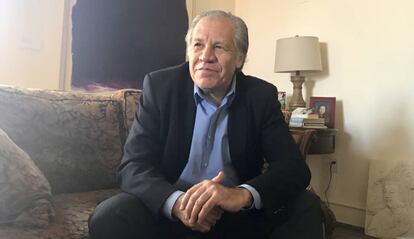OAS chief: “The Americas are cutting out their corrupted parts”
Luis Almagro discusses the challenges facing the region ahead of the Summit of the Americas in Peru this weekend


Things are starting to shift in the Americas. Three years ago, the thaw in US-Cuban relations and the specter of recession were at the center of media attention. But a political storm is now sweeping the continent, and its effects are taking several forms – from the Donald Trump presidency and the drawn-out crisis in Venezuela, to the wave of corruption-related resignations and jailings.
These and other issues will come under discussion at the 8th Summit of the Americas, a gathering of leaders from the Western Hemisphere that will be held Friday and Saturday in Lima, Peru. One of the most notable guests at the summit is Luis Almagro, Secretary General of the Organization of American States (OAS), the world’s oldest regional organization.
EL PAÍS recently sat down with Almagro, a Uruguayan diplomat and politician who served as foreign minister between 2010 and 2015 under José Mujica, to find out about his views on recent events, as well as his expectations for the upcoming gathering. The interview took place inside his official residence in Washington DC, on a cold Sunday morning that held the promise of snow.
Question. These are troubled times in the Americas. What’s going on?
Answer. For a long time, the continent pretended that things were going well, but bad practices kept building up, corruption became rampant, as evidenced by the Odebrecht case, and the political system was affected – sometimes the judiciary was co-opted, sometimes congressional work was blocked. What we are seeing now is a reaction to all that. Political systems are trying to cure themselves, to perform surgery in order to cut out the rotten parts and heal the infections.
When it comes to the US, there is a continuity in facts, it’s just the rhetoric that has changed
Q. That is a positive reading of the fact that Brazil’s Lula da Silva has been jailed and Peru’s Kuczynski has resigned.
A. The worst that can happen in connection with corruption is not putting it on trial. What we are experiencing now is a period of development, a growth spurt of the democratic system. That is, in essence, what’s going on in the continent.
Q. What would make you say that the summit has been a success?
A. If we manage to reinforce the inter-American anti-corruption system and the mechanisms that make it effective. If additional resources are released to ensure they do their work, that would be a success.
Q. Are you expecting a joint statement on Venezuela?
A. These summits are usually remembered for their political context. The last one stood out for Cuba’s return to our fold. And this one will be marked by Venezuela’s absence, and by its crisis. I am not expecting a joint declaration because there is no consensus, but I do expect strong statements and a sum of actions. The only way forward with Venezuela is through international pressure, through tougher sanctions to open up a negotiating space that will enable a democratic transition. The inter-American community must give the best of itself and keep up the pressure. It must go beyond the sanctions imposed by the EU, the US and Canada.
Q. But progress has been made, hasn’t it?
A. The regime is feeling the international pressure. It no longer enjoys the impunity of the past. The OAS has approved declarations against changes to the constitutional order and demanded a return to democracy and a postponement of elections due to legitimacy concerns. Now we must step up efforts to induce this transition process.
The only way forward with Venezuela is through international pressure
Q. Some people hold that it is unfair to leave Venezuela out for internal reasons.
A. Venezuela’s absence proves that the countries on this continent are concerned about the creation of a new dictatorship in the hemisphere. It is a message that underscores that the Venezuelan political system is working in an undesirable way. That’s the main thing. But there should also be a message about Cuba, because it’s an even worse dictatorship than Venezuela.
Q. There is an actor who will not be at the summit, but whom everyone is talking about: China. Is that a destabilizing or a development factor?
A. China is one of the main trade partners for Brazil, Argentina, Uruguay, Chile, Colombia, Ecuador and Peru. And that is an important, positive relationship. What’s more, exchanges that were once unfavorable have been inverted: imports of capital goods are cheaper and our exports of raw materials more expensive. And I have never seen China violate any agreement.
Q. But the US wants to reduce Chinese influence, and is putting on pressure to do so.
The Barack Obama administration deported more Latin Americans than all those that Trump will ever deport
A. A bilateral relationship is something that needs to be worked on, and there is no country on the continent that is unwilling to have increased trade, investment and cooperation with the US. But positive responses from the US are also required.
Q. A better offer, you mean…
A. The possibility of dealing with positive offers. From a political viewpoint, it is obvious that US participation in international forums is much more important than China’s. Washington plays a determining role in the Inter-American Development Bank and the OAS, but what’s required here is a more favorable offer from the commercial and economic standpoint. China’s influence is measured in economic terms more than in political terms.
Q. Donald Trump, who will not be attending the summit, has opened up a border dispute with Mexico, declared a tariff war, questioned NAFTA, and walked out on the Trans-Pacific Partnership. Don’t you view the US as a source of regional concern?
A. When it comes to the US, we are seeing a rhetoric that is closely tied to its domestic policy, and which has affected bilateral relations with Mexico, for instance. But if you look at their actions rather than their words, there is a lot of continuity. The Barack Obama administration deported more Latin Americans than all those that Trump will ever deport. There is a continuity in facts, it’s just the rhetoric that has changed.
Q. And you’re not afraid of this rhetoric?
A. Its relationship with Latin America has always been extraordinarily favorable to the US. Why break it? What would be truly ideal is to go to the summit with an agenda to improve human rights, democracy, trade and cooperation. That’s what should emerge from the summit.
English version by Susana Urra.
Tu suscripción se está usando en otro dispositivo
¿Quieres añadir otro usuario a tu suscripción?
Si continúas leyendo en este dispositivo, no se podrá leer en el otro.
FlechaTu suscripción se está usando en otro dispositivo y solo puedes acceder a EL PAÍS desde un dispositivo a la vez.
Si quieres compartir tu cuenta, cambia tu suscripción a la modalidad Premium, así podrás añadir otro usuario. Cada uno accederá con su propia cuenta de email, lo que os permitirá personalizar vuestra experiencia en EL PAÍS.
¿Tienes una suscripción de empresa? Accede aquí para contratar más cuentas.
En el caso de no saber quién está usando tu cuenta, te recomendamos cambiar tu contraseña aquí.
Si decides continuar compartiendo tu cuenta, este mensaje se mostrará en tu dispositivo y en el de la otra persona que está usando tu cuenta de forma indefinida, afectando a tu experiencia de lectura. Puedes consultar aquí los términos y condiciones de la suscripción digital.








































